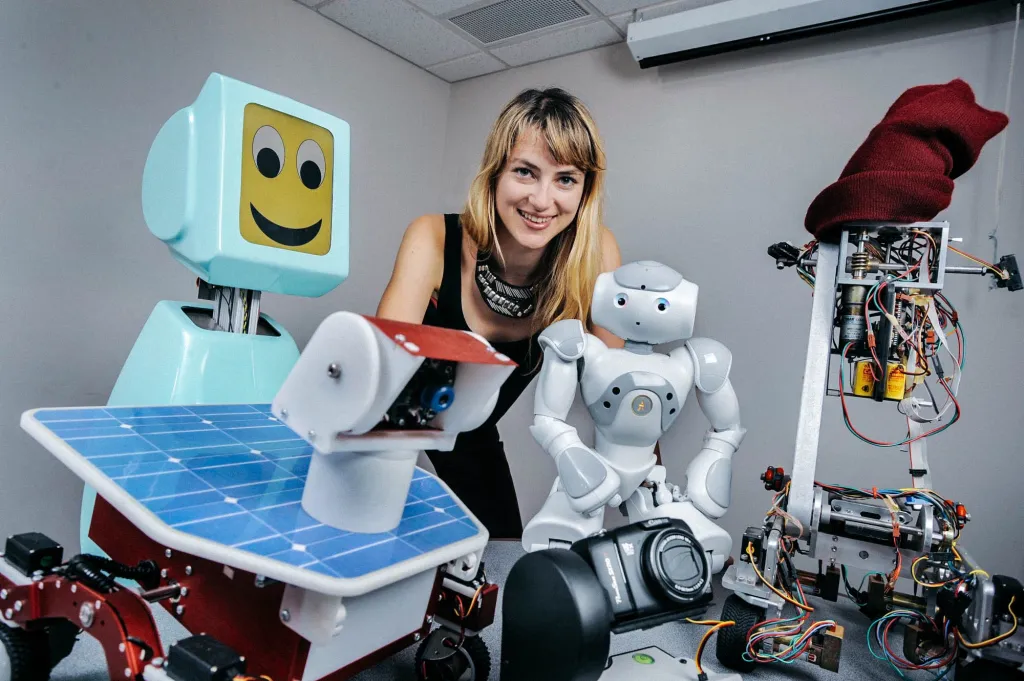Best Practices for Robot Death
Time: Fri 2024-02-23 11.00
Location: Room 1440 "Henrik Eriksson", Osquars backe 2, floor 4
Video link: Zoom
Language: English
Participating: Heather Knight, Assistant Professor, Computer Science, Oregon State University, USA

Abstract
Have you ever been sad after losing a pet, lost all data on your phone, or spilled coffee on your laptop? Imagine how a robot owner might feel after losing their companion robot, or seeing its memory and capability erased. We often replace phones after mere years of use, robot software goes out of date much faster than a dog or cat's lifespan, yet there are few social considerations for the grief a human might feel in losing software support for a robot system, or over robot hardwares for which no new parts are constructed. Yet, just like living systems, impermanence in technological systems is a given. This talk considers ways in which perspectives from Social Robotics — a field that leverages anthropomorphism, i.e., the ways in which humans automatically imbue humanlike characteristics to non-human things — can inform future social considerations and best practices for Robot Death. For example, social structures and legal mechanisms that take human-robot bonding into account by compassionately delivering news, and/or validating naturally existing sadness post-machine decline. Drawing from my personal experience having a Nao robot stolen out of my car in Corvallis, OR, from analyses of robot funerals after Starship Robots are hit by cars or trains, and international examples of ceremonies conducted for lost machines, this talk acknowledges that digital lives can also experience existential 1's and 0's. What can Social Robotics as a field teach us about compassionately handling robot and machine death? Moreover, how might robots and machines help us to compassionately navigate impermanence and suffering in our own lives? We finish with a discussion of opportunities for robot-facilitated mindfulness practices, including "maranasati," which means mindfulness of death and has surprising benefits to one's mental health.
Bio
Dr. Heather Knight is an Assistant Professor of Computer Science at Oregon State University, and directs the CHARISMA Robotics Lab , advising students in Robotics, EECS, AI, and MIME. Her students investigate multi-robot expressive motion, human-robot interactive communication, interfaces for human-in-the-loop robot control, and frequently use entertainment methods to bootstrap the development of everyday social robots. Past projects include Cyberflora, a robot flower garden installation at the Smithsonian/Cooper-Hewitt Design Museum, Silicon Comedy, an online learning system for interactive robot comedy featured on TED.com, and This Too Shall Pass, a music video featuring a two-floor Rube Goldberg Machine that won a British Video Music Award. Her academic background included a postdoc at Stanford University exploring minimal robots and autonomous car interfaces, a Robotics Ph.D. at Carnegie Mellon University on Expressive Motion for Low Degree-of-Freedom Robots, and M.S. and B.S. in Electrical Engineering & Computer Science at Massachusetts Institute of Technology, where she developed a sensate skin for a robot teddy bear at the MIT Media Lab. Outside of academia, she has developed robotics and instrumentation at NASA’s Jet Propulsion Laboratory, and sensor and field applications as an early employee of Aldebaran Robotics, the developers of the Nao and Pepper robots (since acquired by Softbank).
